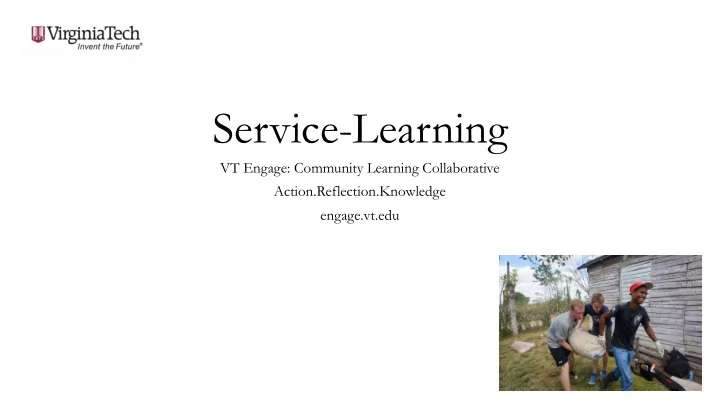

Service-Learning VT Engage: Community Learning Collaborative Action.Reflection.Knowledge engage.vt.edu
What is Service-Learning? • A teaching and learning approach that integrates meaningful community service with instruction and reflection to • Enrich the learning experience • Teach civic responsibility • Strengthen communities Source: National Commission on Service Learning, 2002
What is Service-Learning? Service Learning Field Education Community Service Volunteerism Internship Graphic from Furco, Andrew. “Service-Learning: A Balanced Approach to Experimental Education.” 1996.
Service Learning – Approaches to Consider Concepts Actions • ¡ Students set an agreed regular schedule • Consistent engagement with project throughout course with sites. Journal entry after each engagement. • Project benefits the community and • Host an initial meeting with site the student – “community-defined” representatives and/or tour of site. • Opportunities for reflection that • Small group discussions, poster consider different styles of creations, scrapbook of reflections, expression. presentations to class.
Benefits for Faculty • Values community-based knowledge • Identify areas for research and publication • Application of students’ skills and development • Opportunities to collaborate with community organizations – further own understandings.
Service-Learning at Virginia Tech Examples of projects • Community Nutrition Course - Small groups that adopt a partner focused on nutrition. • Interpersonal Communication – Language and Culture Institute Conversation Partners • Professionalism in Computer and Electrical Engineering – Assistance to robotics teams. • Productivity and Quality Leadership – Students research a problem and propose a solution at the guidance of a community partner.
Excursions to Community Partners Monthly visits to VT Engage community partners to showcase potential projects. Next excursion: • August 19 th : NRV Home Consortium / Town of Blacksburg – discussion on affordable older adult housing and community development in the NRV.
How VT Engage can support faculty. • Provides faculty support in the following ways. • Identification of community partners • Course design/syllabus consultation • Placement of students with projects (if needed) • Logistics (setting up orientations/resolving challenges/tracking outcomes/hours) • Reflection strategies/assistance with classroom discussion • Assistance with evaluating experience. • Community partner network Inclusive of local/regional/international opportunities.
What is Global Service-Learning • Course-based form of experiential education in which students, faculty, staff, institutions • Collaborate with diverse community stakeholders on an organized service activity to address real social problems and issues in the community • Integrate classroom theory with active learning • Gain knowledge and skills related to the course content and advance civic, personal and social development • Immerse themselves in another culture, experience daily reality in the host culture and engage in dual exchange of ideas Source: Bringle and Hatcher, 1995; Grusky, 2000; Kiely, 2005; University of Denver, 2006; University of Georgia, 2011
Why Global Service-Learning? • Transformative impact • Increases students’ • Intercultural competence • Language skills • Appreciation for cultural difference • Tolerance for ambiguity • Experiential understanding of complex global problems • Profound changes in their world view: political, moral, intellectual, personal, spiritual, cultural • “…not about accumulating more knowledge but seeing the world in a profoundly different way, one that calls for personal commitment and action.” (Kiely 2004)
Global SL.org • Resource for international service-learning • Tools • Research • Ethical Service Video from Global SL
Global Service-Learning: Initial Things to Consider • Theme / Topic of interest • Women’s Rights • Education • Environmental Conservation • Location • Community Need & Interest • Partner Vetting • Staff – availability • Language • Project Accessibility • Transparency • Cost
Global Service Learning: Initial Things to Consider • Site Visit • Background of the Organization • Service Work – Needs of the community • Location – Safety & Accessibility • Facilities – Accommodations, Meals • Child Protection – if applicable • Risk Management • VT Global Travel Policy • Approval at the Department level • Registration through Global Education Office
Types of Global Service-Learning Programs • Course in-country • Programs combining on-campus academic work before and after the International Service-Learning experience • Co-Curricular programs, include structured reflection and learning • VT Engage programs
Overview: Global Service-Learning Programs • Service work • Working with communities • Establishing long-term relationships • Community empowerment & capacity building • Reciprocity & Respect of local traditions and culture • Student Preparation & Reflection during / after the trip • Active citizenship
Thank you! / Questions
Recommend
More recommend